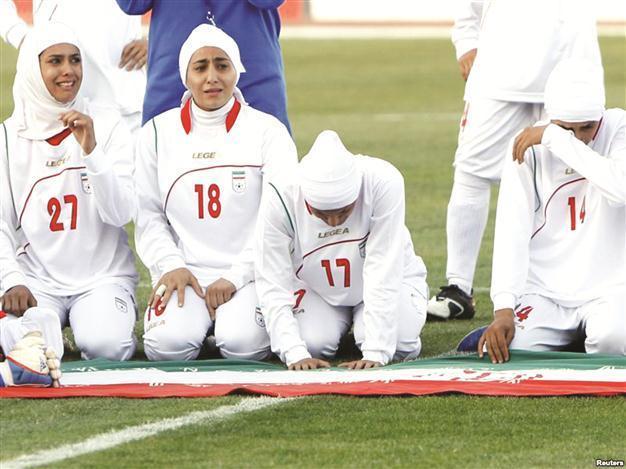FIFA signalling compromise on hijab ban
James M. Dorsey

This file photo from June 2011 shows Iranian national women’s football team dejected after being barred from playing a 2012 London Olympics qualifying match against Jordan.
FIFA has endorsed a proposal to lift a controversial ban on the hijab in a move that offers a resolution to demands of female football players who wear the religious headscarf.
At its executive committee meeting in Tokyo, the world football body submitted the proposal brought forth by Asian Football Confederation (AFC) Vice President and Jordanian Prince Ali bin al-Hussein to the International Football Association Board (IFAB), which governs the rules of association football. IFAB is expected to discuss the proposal that calls for the sanctioning of a safe, Velcro-opening headscarf for players and officials at its next scheduled meeting March 3.
FIFA’s endorsement follows an earlier approval of the AFC proposal in a workshop convened in October in Amman by al-Hussein.
The dispute over the hijab led to the disqualification of the Iranian women’s national team in June after they all appeared wearing hijab for a 2012 London Olympics qualifier against Jordan. Three Jordanian players wearing hijab were also barred.
The Iranian team’s insistence on wearing hijab contradicted an agreement reached last year in Singapore between FIFA and the Iranian Football Federation (IFF), under which the Iranians agreed to wear a cap that covered hair but not the neck.
The measures were taken on the grounds that FIFA bans all religious and political symbols on the pitch on the basis of IFAB’s Law 4, which only lists jerseys, shorts, socks, shin-guards and footwear as the sanctioned basic equipment for a player. Applying Law 4 is complicated because interpretation of the IFAB rule is left to referees, which has led to differing interpretations on the pitch.
“This issue impacts millions of women worldwide and it is crucial to address, in the best possible way, the issue that ensures the safety of the players, respects culture and promotes football for all women without discrimination. This is a crucial step forward. Our goal at the end of the day is to ensure that all women are able to play football at all levels without any barriers,” al-Hussein said.
A decision by the Amman workshop to view the hijab as a cultural rather than a religious symbol helped pave the way for the AFC and FIFA endorsement.
“The hijab issue has taken center stage in football circles in recent years due to the increasing popularity of women’s football worldwide. It is a cultural issue that not only affects the game, but also impacts society and sports in general. It is not limited to Asia, but extends to other continents as well,” the executives and players said in a statement issued at the end of their meeting.
By defining the hijab as a cultural symbol, the group, meeting under the auspices of the Asian Football Development Project (AFDP), an NGO founded by al-Hussein to advance grassroots, youth and women’s football, laid the groundwork for a compromise that acknowledges observant Muslim women’s cultural requirements and meets FIFA’s health and safety standards.
IFAB’s adopting the FIFA endorsement would indeed solve the problem for Muslim women who want to play association football in a way that allows them to adhere to their interpretation of Islam, but it does not fully end Iran’s problem with FIFA.
In Iran, the hijab is compulsory for female Iranian players and the country imposes wearing the hijab on foreign female teams playing in the Islamic republic. Iranian football officials have acknowledged that this was likely to remain an issue even if IFAB adopts the resolution. Iran is the only country that has made the hijab compulsory for its female players and for visiting female foreign teams.
FIFA’s endorsement is based on the group’s suggestion the world football body should weigh lower safety risks against the greater health benefit of women playing football and that allowing the hijab or an equivalent would persuade more women to become players and empower them across cultures.
Prominent football executives, female players and coaches, including the head of FIFA’s medical committee Michel D’Hooghe, AFC Vice President Moya Dodd, members of FIFA’s women’s committee and football body representatives from Jordan, Bahrain, Iran and England all attended the workshop earlier in October.
England, alongside FIFA, Wales, Scotland and Northern Ireland, form IFAB.
